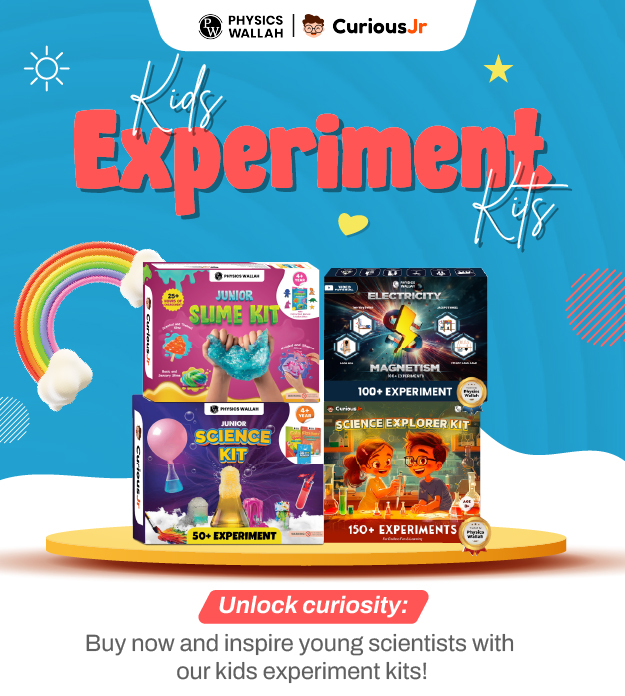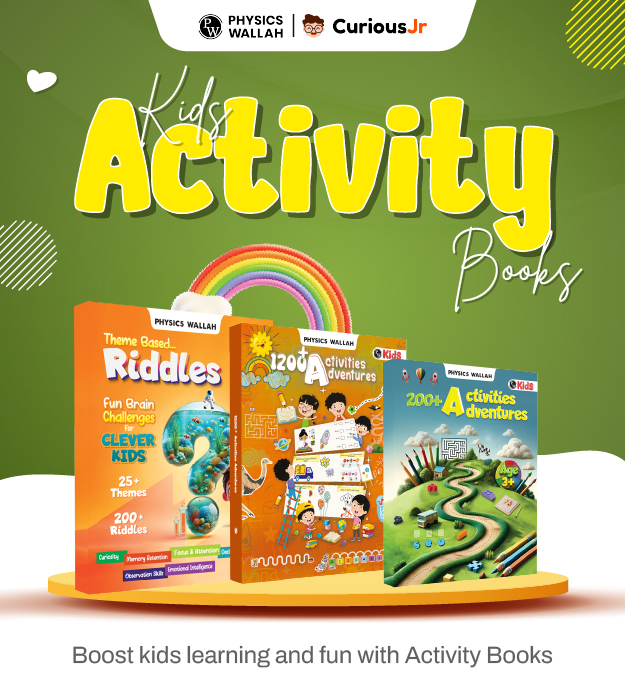Kid’s Electric Experiment Kit: Ages 8-14 Fun Learning

Kid’s Electric Experiment Kit: Ages 8-14 Fun Learning: Students ages 8-14 must learn electricity because it helps them understand the technology around them. Physics Wallah provides the electrical experiment kits for ages 8-14 kids who are curious about electrical projects i.e., Electricity and Magnetism Science Project Kit for Kids Ages 8-10-12-14 Years Old. These kits by Physics Wallah help students learn about electricity through fun and engaging projects. By using these kits, kids can explore basic electrical concepts, develop important skills, and have fun while learning. Go through this article to learn more about these kits, their working methods, benefits, etc.
Kid’s Electric Experiment Kit for Ages 8-14
Kid’s electric experiment kits are designed to make learning about electricity easy and enjoyable. Students can check below to know what these kits include to add valuable learning to the students.
-
Attracting Design: The most interesting part of these kits is that they are very colorful and attractive. The colorful kits attract students’ attention and help the learning process to be more engaging.
-
Easy to Understand Instructions: Each kit comes with simple, step-by-step instructions. These instructions are designed to be easy for kids to follow so that they can complete their projects with minimal help from others.
-
Educational Value: These kits include basic concepts about electricity. Kids learn about the current, circuits, electricity flow, etc. This basic knowledge is more important to understand the topic of Electricity.
-
Hands-On Learning: These kits allow students to perform electrical experiments on their own and learn how it works.
Read More: 25+ Simple Science Projects for Kids to Explore
Creative Electrical Experiment Kit for Ages 8-14 Years
A creative electrical experiment kit makes learning interesting and takes it to the next level by adding fun. These experiment kits include
-
Different Components: These kits include different parts such as wires, batteries, light bulbs, and motors. With these components, kids can experiment with various types of circuits and create different projects.
-
Interactive Experience: Kids can build their own electrical projects, like making a simple light or a small motor. This interactive approach allows them to experiment and learn by doing.
-
Skill Development: By doing these electrical experiments, students can develop their problem-solving skills and critical-thinking skills. These skills will help them to solve any critical problems in future.
Read More: 10 Science Project Ideas for Class 10
Fun Electrical Science Projects for Fun Learning
Physics Wallah’s electrical science projects are designed to be both fun and educational. Students can also work on some basic electrical science project kits that are discussed below.
-
Flashlight Building: This kit helps students understand the practical uses of electricity by showing them the work model of a circuit to power a flashlight.
-
Buzzer System Kit: Another project might involve making a buzzer system that sounds an alarm. By doing this project, students can learn how electricity can be used to create sound and help kids learn about electrical components like buzzers and switches.
-
Creating Mini Fan Kit: This kit helps to create a small working fan. This project shows how motors work and how electricity can be used to create movement.
-
Building Alarm System: As a fun electrical science project, kids can create a basic alarm system that uses sensors to detect when something is moved or touched. This project teaches them about sensors and how they can be used in everyday devices.
Read More: Class 8 Science Project Ideas
Science Project on Electricity
Some science projects Kits stand out because those projects are educational and engaging. Students can check some of the science projects on electricity below
-
Circuit Boards: Building a circuit board is the most exciting science project. Kids can use components like LEDs, sensors, and switches to create a circuit board that can perform different functions. This project helps them understand how complex electrical systems work.
-
Light Display: Creating a light display with LEDs is another great project. Kids can design patterns or effects, and learn how lights are controlled through circuits.
-
Miniature Electric Vehicles: Building a small electric vehicle is a fun way to learn about motors and energy conversion. Students will learn about the movement of power in this project.
Read More: Simple Science Experiments
Benefits of Electrical Experiment Kit for Students Ages 8-14
There are so many benefits of doing electrical science Experiment Kit. Kids can go through the benefits below
-
The kits help kids develop important skills such as problem-solving and critical thinking. They learn to figure out how to connect components correctly and solve any issues that come up.
-
Kids gain practical experience with electrical components. This hands-on approach helps them understand complex ideas by doing them in practice.
-
After completing the projects, kids get a boost in confidence. This confidence encourages them to continue exploring and learning, and it can lead to a greater interest in science and technology.
-
The interactive nature of these kits makes learning enjoyable. Kids are more likely to be engaged and excited about science when they can enjoy their education.
-
Kids will easily understand the critical topics if they understand the basic concepts now. These kits provide a solid foundation that can help in future science education and projects.
Important Tips for Using Electrical Experiment Kits
Students must remember the below points while performing any science project to get the most out of it.
-
Safety First: Always perform the experiments under supervision. Students must understand the basic safety rules such as not touching wires with wet hands or overloading circuits.
-
Encourage Exploration: Let kids experiment and come up with their own ideas for projects. Encourage them to think creatively and explore different ways to use the components.
-
Ask Related Questions: Engage with your child by asking questions about their projects. This can help them think more deeply about the projects.
-
Celebrate Achievements: Celebrate the completion of projects and the progress made. Appreciate their accomplishments and hard work. It can boost their motivation and interest in learning.
Also, check out the interesting 150 science experiments kit
Electrical Experiment Kit FAQs
Q1. What do children learn from science experiments?
Ans. Doing science experiments will get children to begin observing the world around them. Their observation will lead to questioning why things work the way they do.
Q2. Why are science kits good for kids?
Ans. Kids learn skills and concepts more quickly, retain in memory longer, and have more fun, when they learn with practical experiments rather than simply reading about them in textbooks.
Q3. What are science tools for kids?
Ans. Science tools for kids are magnifying glasses, thermometers, pH test strips, rulers, tape measures, nets, measuring cups, microscopes, stopwatches, binoculars, telescopes, magnets, and weighing scales.
Q4. Why do kids love science?
Ans. Science helps kids to look at the world with new vision and light and helps them understand things from all five senses. Science will help to improve their overall success, whether, they are collecting samples out in nature or doing research in a lab.
Q5. What is the use of an electronic kit?
Ans. Electronic kits are used in a variety of environments for carrying out different tasks, such as maintenance, electrical work, and other engineering purposes.
Q6. What do children learn from science activities?
Ans. Kids learn various things from science activities. Science activities help them think critically, improve their problem-solving skills, and understand their world better.
Q7. What is an electrical kit?
Ans. An electronic kit is a package of electrical components used to build an electronic device. An electrical kit includes electronic components, a circuit diagram (schematic), assembly instructions, and often a printed circuit board (PCB) or another type of prototyping board.










